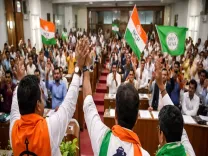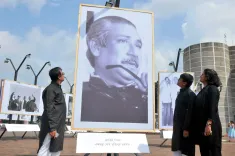Is Bangladesh Descending into the Depths of Islamic Fundamentalism?

Synopsis
Key Takeaways
- Bangladesh faces a surge in Islamic fundamentalism.
- Women's rights and cultural expressions are under threat.
- Radical groups like Jamaat-e-Islami are gaining influence.
- Incidents of harassment against women are increasing.
- The military's weakness may exacerbate the situation.
Dhaka, Nov 21 (NationPress) Following the demonstrations in July 2024, Bangladesh has been swiftly descending into the depths of Islamic fundamentalism, according to a report released on Friday.
The report highlights that Bangladeshi women, who have significantly contributed to the nation’s advancement, are facing opposition from the radical Islamist party Jamaat-e-Islami. Their leader insists that women should prioritize family over careers, while other party officials are vocally advocating for restrictions on women's employment.
“Incidents of assault and harassment against female athletes are becoming alarmingly frequent. The esteemed cultural organization Chhayanaut in Dhaka has nearly ceased its public activities. Law enforcement is reluctant to approve events featuring Tagore’s songs and dances. Women are openly harassed for their attire; in one incident, a Dhaka University staff member harassed a woman for wearing what he considered 'un-Islamic' clothing. Although police arrested him based on her complaint, a mob later liberated him, celebrating him as a hero, and he subsequently shared a platform with religious leaders,” the Northeast News report elaborated.
Earlier this month, the interim government led by Muhammad Yunus abandoned a plan to recruit music educators for primary schools. Since Bangladesh’s Liberation from Pakistan 54 years ago, music has been an integral part of the school curriculum, but Islamists denounce it as an 'un-Islamic' practice, demanding the appointment of teachers for Islamic studies instead.
“There are approximately 15,000 to 20,000 madrasas teaching Arabic and advocating for the most stringent Wahhabi interpretation of the Quran. This exemplifies the transformation of Bangladesh, which is rapidly becoming a focal point of Islamic fundamentalism,” the report states.
The report also underscores the events that unfolded immediately after the July protests, during which Islamists rampaged across the nation, vandalizing sculptures, including those depicting leaders of the freedom struggle against Pakistan.
“This was closely followed by a wave of attacks on Sufi Islamic mazars or shrines, with nearly 80% of these sites now destroyed. Numerous assaults on Sufi performers have occurred, including instances where they were forcibly shaved to adhere to strict Islamic customs,” it noted.
According to the report, the protests last July that led to the downfall of Sheikh Hasina's Awami League government are now perceived as a coordinated movement rather than a spontaneous student uprising. Jamaat has claimed full responsibility for orchestrating the protests, with their Deputy Chief asserting, 'our movement from start to finish.'
The report emphasizes that the success of these protests has strengthened the Islamists, who already act as the de facto power brokers within the Yunus administration, now aspiring to seize power outright.
“How this situation will evolve is uncertain, but Bangladesh could soon emerge as a more significant concern for the world than Pakistan. In Pakistan, power lies with the military, and the judiciary maintains some degree of independence. Conversely, Dhaka possesses a weak military reliant on UN peacekeeping operations. The current trajectory indicates that Bangladesh may soon escalate into new levels of Islamic extremism, with its military potentially too fragile to manage it,” the report concluded.










